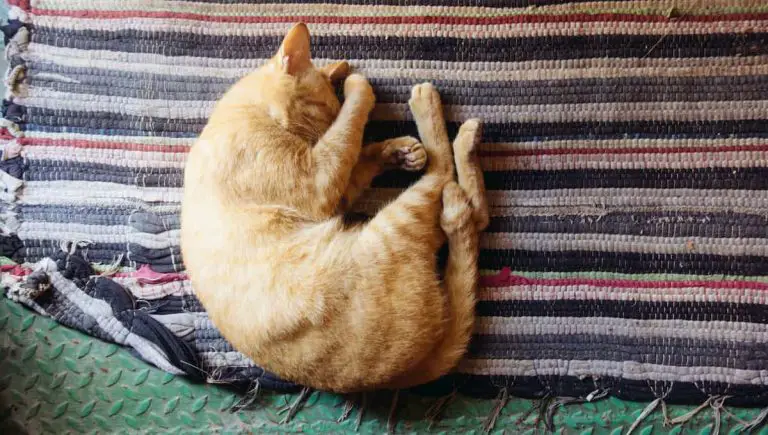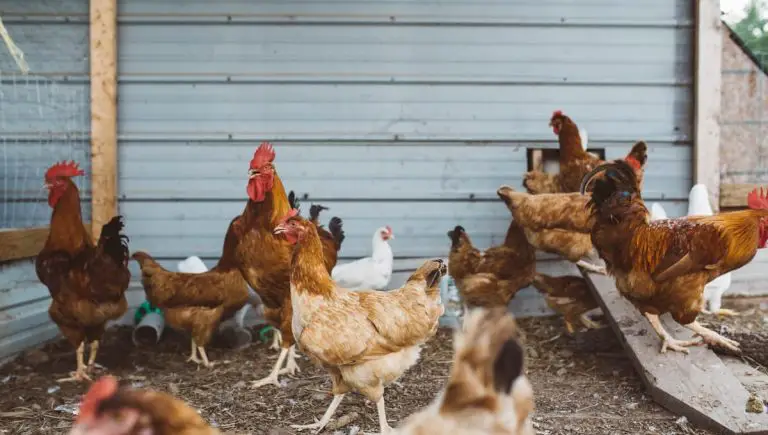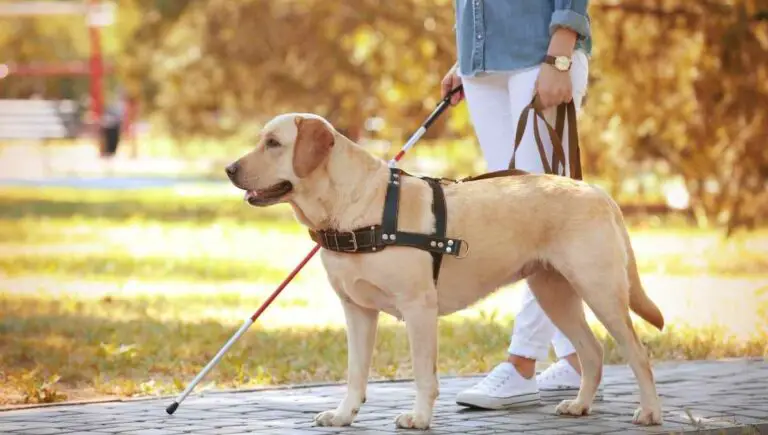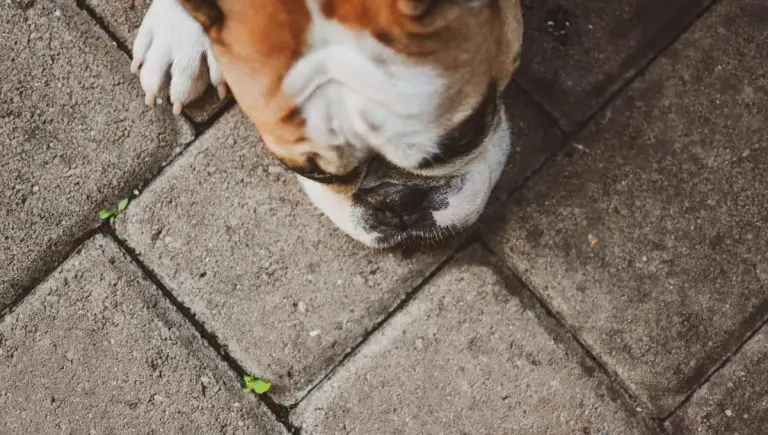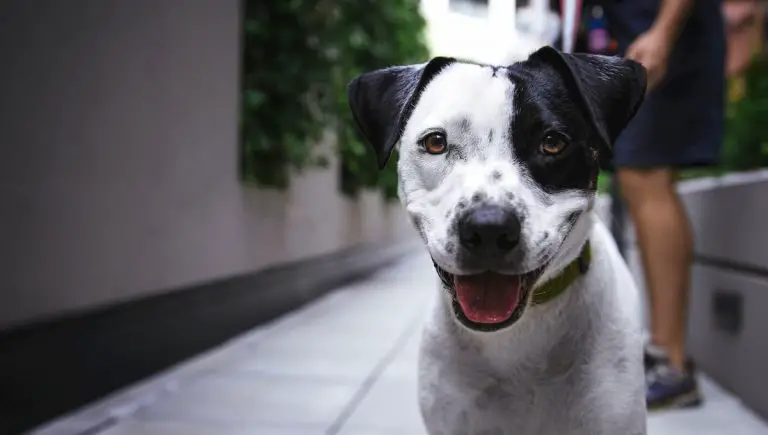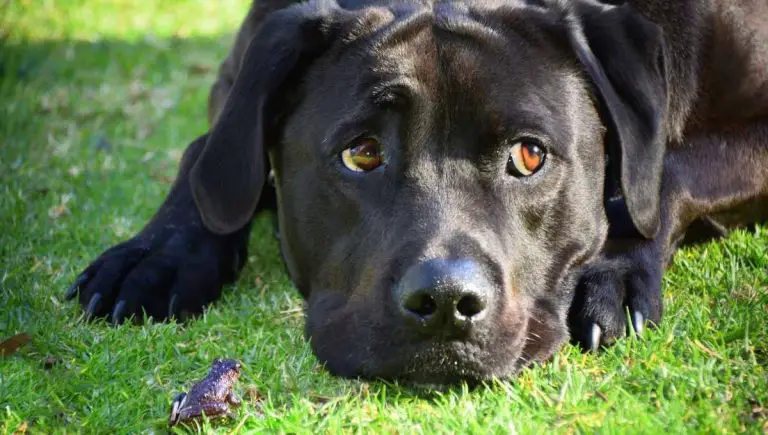Who Picks up a Guide Dog’s Poop? (The Law Says This…)
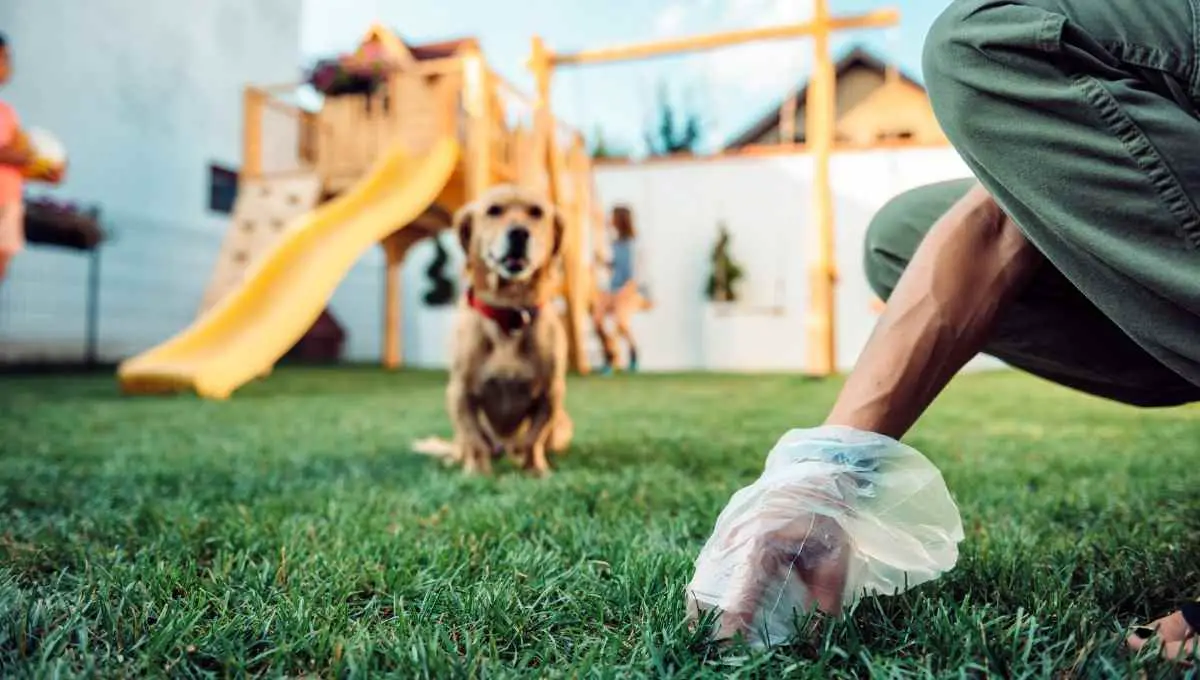
Accidentally stepping in stinky dog poop is an annoying and messy experience for anyone. You’re required by law in most places to pick up and properly dispose of your dog’s poop. What about blind and visually impaired guide dog owners? Who picks up a guide dog’s poop?
The responsibility of cleaning up a guide dog’s poop belongs to the owner of that dog. Although they may be blind or visually impaired, guide dog owners are both capable and encouraged to pick up the waste left behind by their dogs.
But it isn’t always that simple. In this blog post, we will take a look at what happens if the owner is unable to clean up after their dog, the consequences for not doing so, and much, more.
This post contains affiliate links from Amazon and other stores. This means Yard Blogger may earn a commission if you make a purchase using any of our links. Please refer to our full affiliate disclosure policy for full details.
Here’s a Quick Pro Tip!
One of the best and most popular tools used to pick up poop for guide dogs (and dogs in general) is Nature’s Miracle Non-Stick Pet Poop Scoop
This poop scooper is great for people with mobility problems since you don’t have to bend over to clean up after your dog.
Additionally, Amazon Basics Poop Bags are a favorite for dog owners when clean-up time comes.
- Who Is Responsible For Picking Up a Guide Dog’s Poop?
- How Does a Blind Person Pick Up Their Dog’s Poop?
- Does a Blind Person Have to Pick Up Their Guide Dog’s Poop?
- How Does a Blind Person Clean Up After Their Dog?
- Are Guide Dogs Exempt From Fouling Laws?
- What Determines Where a Guide Dog Poops?
- Conclusion
Who Is Responsible For Picking Up a Guide Dog’s Poop?
Although guide dog owners are responsible for cleaning up after their dogs, they are not legally required to do so.
Guide dogs and their owners go through several weeks of training together under the supervision of a professional dog trainer, and bathroom usage is one of the topics covered.
How Does a Blind Person Pick Up Their Dog’s Poop?
Guide dogs learn as puppies to go potty on command and encourage their owners to clean up after them. A blind person picks up their dog’s poop through training and patience, and they go through this training process under the guidance of a professional.
The process goes as follows:
- The dog owner prepares a poop bag for picking up.
- The owner commands the dog to poop.
- The dog poops.
- After pooping, the dog remains where it is.
- The owner runs their hand along the rump of the dog and down its back leg to where poop is located.
- The owner picks up poop, closes the bag, and disposes of it at home.
Does a Blind Person Have to Pick Up Their Guide Dog’s Poop?
Guide dog owners are not legally obligated to clean up after their pets, but most do.
It’s a common misconception that blind people are incapable of cleaning up after their pets.
A good way to see how difficult this really is would be to simply close your eyes the next time your dog starts to potty, then try to locate and pick up the mess they leave behind.
You may be surprised at how easily the poop can be located if you know right where your dog is standing when they are doing their business.
Additionally, guide dogs poop and pee on command and wait to move after going potty until their owner tells them to. This gives the owner plenty of time to use the dog’s location as a guide and find the poop.
You might also enjoy our post on How Do Guide Dogs Know Where to Go?
How Does a Blind Person Clean Up After Their Dog?
Guide dog owners use the same tools and methods to clean up after their dogs as the rest of the dog-owning population does: by using plastic disposal bags. There are many great poop cleanup tools on the market.
From classic plastic bags to long-handled pooper scoopers, the options are numerous and useful.

Nature’s Miracle Non-Stick Pet Poop Scooper is one of several such tools. The long handle and wide jaws allow for an easy and smooth cleanup process, where the owner doesn’t even have to bend over and risk injuring their back.

If you want to go the more traditional route, however, try Amazon Basics Scented Dog Poop Bags.
This deal even comes with a complimentary dispenser and leash clip to attach the roll of bags to your leash. If you want different colored bags, Amazon has a wide variety of poop bag colors and sizes.
Another very handy tool for guide dogs is the toileting harness. A guide dog toileting harness is a thin belt that goes around a dog’s waist or tail.
Attached to the bottom of the belt is a poop bag that hangs below the dog, allowing them to poop directly into the bag.
Essentially, a toileting harness is like a diaper for dogs. This allows for a hassle-free walk and no cleanup for the dog’s owner and is definitely a viable option for all dog owners.
You might also enjoy our post on How to Clean Dog Paws After a Walk
Are Guide Dogs Exempt From Fouling Laws?
The short answer is that guide dogs are indeed exempt from fouling laws. They are intelligent, well-trained animals, but just like their human owners, they are not infallible and make mistakes from time to time.
They may be suffering from a stomach bug, or they may have eaten something they weren’t supposed to, and the result could be diarrhea. No matter how well trained a dog is, it won’t be able to stop an attack of diarrhea or a similar ailment.
You may also be asking yourself, “What exactly is fouling?” No, this is not referring to the basketball term either. According to the Collins Dictionary of Law, fouling is when a dog poops and the owner fails to clean up the excrement.
Fouling is actually more of a problem than most people think it is. Although it’s common for dogs to eat the poop of other dogs, dog excrement can contain parvovirus, whipworms, hookworms, roundworms, threadworms, campylobacteriosis, giardia, and coccidia.
Each of these diseases can make dogs sick or even be terminal if left untreated. Nausea, dizziness, asthma, seizures, and blindness are the most common symptoms associated with eating poop. Although this it’s very rare, dogs can indeed get sick from ingesting dog poop.
Does the U.K. Have Stricter Laws About Dog Fouling?
While you will most likely not actually go to jail for pet fouling, the U.K. does have stricter penalties for pet fouling. In the U.K., fines of up to 100 pounds ($138 U.S.) can be issued to pet owners for not cleaning up after their dogs.
If the owner repeatedly refuses to pay your outstanding penalty fees, they can end up paying a 1,000 pound fine and be forced to go to court.
Blind people, however, are typically not saddled with these same rules as there are exemptions in place to excuse them if they fail to pick up poop on public land.
For additional information on Britain’s pet fouling laws visit Guide to dog fouling and UK law | Compare the Market.
What Determines Where a Guide Dog Poops?
The owner of the guide dog determines where the guide dog poops.
As puppies, guide dogs are taught two-bathroom commands, “Busy Busy” for peeing, and “Big Busy” for pooping. Using these commands, the dog’s owner can decide when and where their dog goes to the bathroom.
The owner is responsible for getting their dog into a toileting routine, so as not to disturb the dog’s digestive system, or command the dog to poop when they simply cannot.
Guide dogs are not gifted with a secret power to be able to poop or pee on an empty stomach or bladder.
The dog and the owner must work together to develop a feeding and toileting system that works for both of them.
Barring sickness or an unavoidable accident, guide dogs will not poop on the street. They are taught from a young age to only poop in appropriate locations and on suitable surfaces, such as grass or artificial turf.
If a dog is not feeling well, it may not be able to hold their poop as readily as when they are healthy. Diarrhea and stomach sickness are afflictions felt by dogs just as badly as humans.
Guide dog owners also make mistakes and may forget to command their dogs to poop.
This could definitely lead to an accident on the street or other inappropriate location. Accidents and owner forgetfulness are usually what lead to pet fouling.
If the owner isn’t aware that their dog is using the bathroom, they will not know that they have poop to pick up.
You might also enjoy our post on What to Do if Your Dog Eats a Dead Bird
Conclusion
The bond between a guide dog and its’ owner is one that is both special and very strong.
Owners depend on their guide dogs to get them where they need to go and the dog relies on the owner to feed them, clean them, as well as clean up after them.
The amount of training and bonding that occurs to make this possible is truly extraordinary.
The guide dog must trust that their owner will command them to poop and pee in a timely manner, and the owner trusts that the dog will be able to wait for his or her command.
While special rules are in place to ensure that no harm or culpability comes to blind dog owners, they are capable and morally obligated to clean up after their pets.
Not only does cleaning up their dog’s poop keep other dogs from getting sick, but it also helps keep the community cleaned up. Nobody wants to live in a world of poopy streets and sidewalks!
Let’s all do our part and make the world a better and cleaner place.

